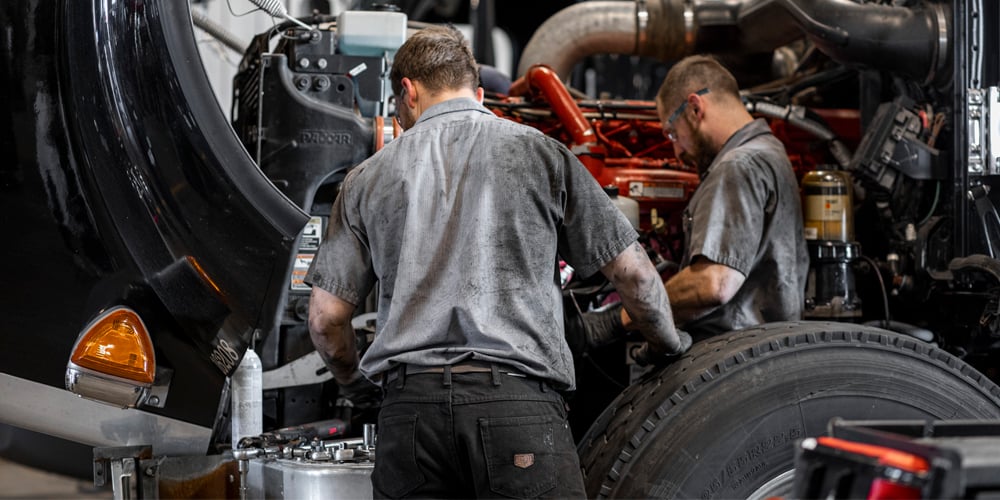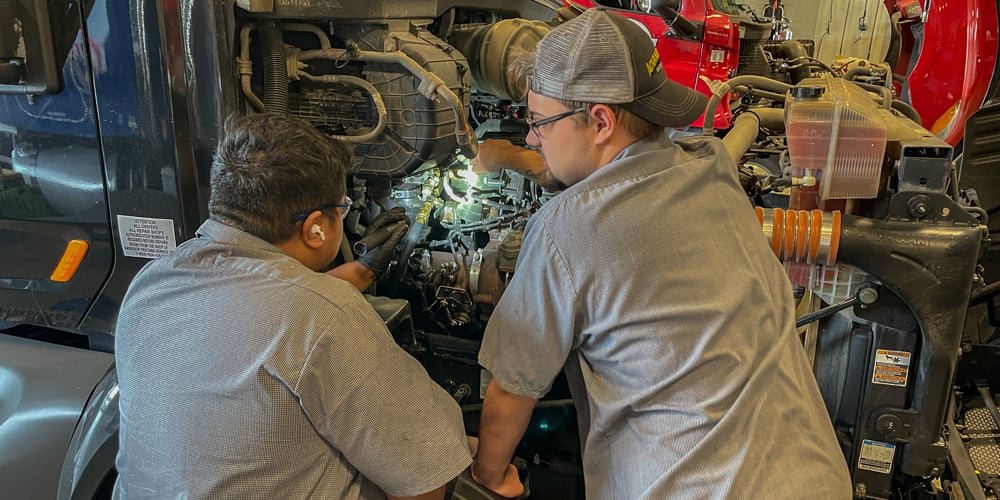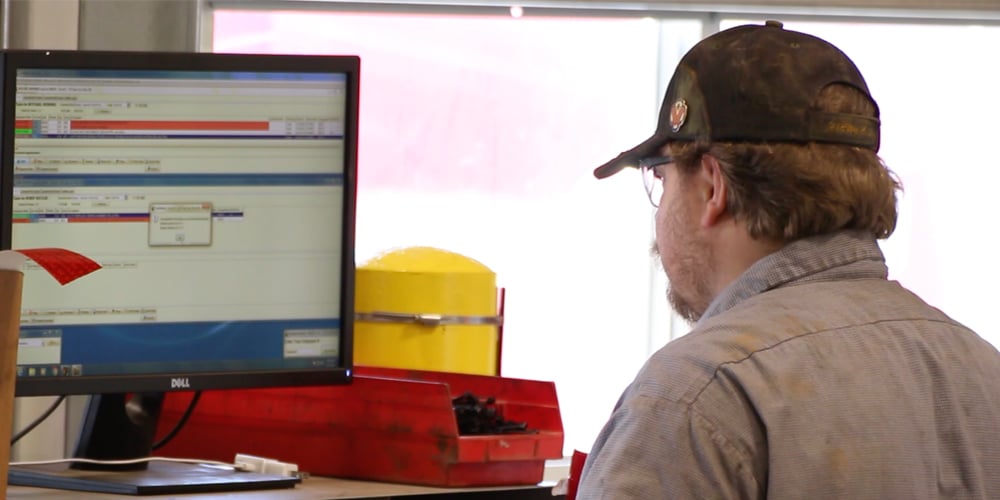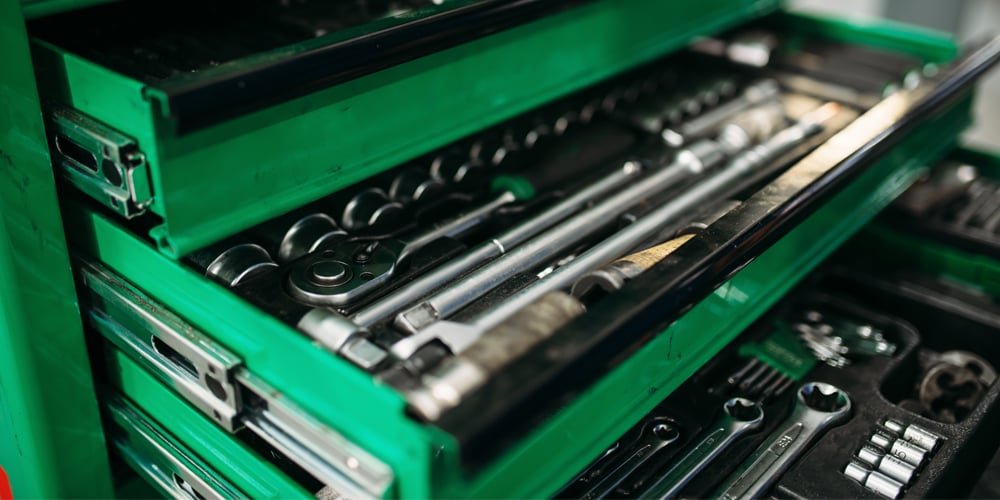 You’ve spent your whole life around cars. You love taking things apart just to put them back together again.
You’ve spent your whole life around cars. You love taking things apart just to put them back together again.
Does that sound like you?
If so, you’ve probably been thinking about a career working on engines — big or small — for years.
Or maybe that’s not your background. Perhaps you just think automotive equipment is cool and think a career as a diesel technician would be fascinating.
That’s okay too.
Here at Anderson Trucking Service (ATS), we’ve been working on trucking equipment (and hiring people to do so) since we were founded in 1955. Over the years, we’ve learned the skills it takes to make the difference between a diesel technician and a great diesel technician.
In this article, we’ll explain the personality traits we see in our best diesel mechanics, along with the skills you’ll want to develop to be successful.
What Personality Traits Should I Have as a Diesel Technician?
Whether or not your childhood was spent around cars, the traits we see in our most successful diesel technicians have nothing to do with knowledge of equipment — at least not at first. It comes down to:
Willingness to Learn
You should be the kind of person that looks at something they encounter in their everyday life and thinks “I wonder how that works.” And, to take things further, if you’re the type of person that goes home and searches Google and/or watches YouTube videos on how that thing works, you’re off to a great start when it comes to being a diesel mechanic.
That desire to learn can’t be taught. We’ve had diesel technicians come in with a decade of experience under their belt thinking they know everything they need to know. But when we try to teach them a new technique, they won’t listen.
That can be a problem when things change with newer equipment. Techs that are willing to learn will go much further than those who aren’t.

Problem-Solving Skills
Problem-solving is a term you’ve probably heard tossed around a lot. But what does it mean for successful diesel technicians?
The obvious thought would be “something broke, let’s fix it.” But successful diesel techs take that a step further and try to figure out what caused that thing to break and what will prevent it from breaking again in the future.
That’s easier said than done, of course. We’ve heard plenty of stories from diesel techs who’ve literally lost sleep trying to figure out something that went wrong in a truck. Not kidding.
In some cases, the fix isn’t that simple. What resources can you use to figure out the solution? Is it a troubleshooting guide from the engine manufacturer or trusty ol’ Google? As long as it gets fixed — and fixed right — it doesn’t really matter what your resources are.
You’re almost like a detective solving a crime. What made this break? How do we find it? How do we solve (fix) it?
What Skills Do You Need to be a Diesel Technician?
In many cases, the two traits we just listed are all it takes to be a successful diesel technician — at first. If you don’t already possess the following four skills, they’re skills you’ll want to develop to be successful.
Attention to Detail
You could argue that this is more of a trait than a skill since it’s hard to teach attention to detail, but we’re putting it here anyway.
Attention to detail is important in any job, but it’s especially true in fleet maintenance. Truck drivers (and the companies they drive for) don’t make any money when the truck is in the shop, so getting the job done right the first time is important for keeping the fleet on the road.
Not only that, but these trucks are also often traveling down the interstate or highways, so there are actual lives at stake — both the driver and the motoring public around them — if a part is installed incorrectly and it causes an accident.
It’s vital that you, as a diesel mechanic, tighten the bolt correctly with the proper amount of torque. Parts can’t be falling off, plain and simple.
From an attention to detail standpoint, it’s also important to document the work you did properly. That helps everyone know the work that’s been done on the truck so they’re not wasting time troubleshooting an issue that’s already been addressed. Or, if the same problem keeps happening, that helps others know there might be a bigger issue going on.
If you just say you did preventative maintenance, that doesn’t really help. Explain what type of preventative maintenance you did. That’ll make you a much more valuable diesel technician.
Electrical
We’re not saying you need to be an experienced journeyman or master electrician, by any means. But knowing a bit about how electricity works is helpful.
There are a lot of electrical components moving through class 8 trucks nowadays, so someone needs to make sure wires are connected properly. If you can be that person, that will only add value to your career. And having the confidence to solder things together won’t hurt either.

Computer Diagnostics
Just like the electricity situation, as the years go on, there are plenty of new computer parts being added to trucks. Diesel technicians have become IT professionals, to a certain degree.
Knowing at least the basics of how those components work will go a long way in making yourself a better diesel mechanic (Google/YouTube can always do the rest).
Customer Service
Did this one catch you off guard? It may sound crazy since you’d think you spend most of your time head down working on an engine, but customer service skills can go a long way in this industry.
While interactions are limited, depending on which company you work for, you may actually be interacting directly with “the customer” (aka, the driver). For many larger carriers, someone else will probably be communicating with the driver — but you’ll probably be the one communicating with that person. Doing so in a professional and respectful way is important.
You’ll also be interacting with your direct supervisor and folks in the parts department regularly. While they may not actually be customers, the skills it takes to be good at customer service are basically the same skills it takes to communicate effectively with your colleagues.

What Else Do I Need as a Diesel Technician?
Beyond skills, there are a couple of other things you need as a diesel mechanic.
It’s standard practice no matter where you start your career as a diesel technician that you come to day one on the job with at least a rolling toolbox and a basic set of tools. Over the years, you can expect that you’ll add to that box as you go, growing the number of tools you have in your tool chest (pun intended).
The initial investment into a tool set is a minimum of $2,500, so it’s not the end of the world if you show up with a limited set of tools on day one. After all, not everybody has a few thousand dollars set aside — especially early in your professional career.
That said, plan to invest in tools with your first few paychecks. Depending on the carrier you work for, some may offer a “community tool chest” that you can borrow from until you can build up your own arsenal of tools (you’ll find one of those here at ATS).
There are also a handful of certifications you’re going to need as a diesel mechanic, however, having those on your first day of work isn’t essential. You can expect to get a Department of Transportation (DOT) certification and it’s a good idea to get a commercial driver’s license (CDL). You’ll also want to get certified through the original equipment manufacturers (OEMs), whether it’s online or hands-on training.
Achieve Success as a Diesel Technician
It’s often said in the industry that there’s a difference between being a technician and being a parts changer. Parts changers are great at following instructions and “changing parts” — and they’re essential to every maintenance facility.
However, a technician takes the initiative to learn and solve problems on their own — finding and fixing things before they even become problems. Technicians also earn more money than “parts changers” do and will work their way up the leadership chain faster.
If you’re happy being a parts changer, that’s great. It really is. But if you strive to get into a leadership position and continuously grow in your career, the six personality traits and skills you’ll want include:
- The willingness to learn
- Problem-solving skills
- Attention to detail
- Electrical skills
- Computer diagnostic skills
- Customer service skills
Whether or not you know anything about diesel engines, these skills will make you stand out among your peers — and help you grow faster. These skills aren’t essential on day one of your career as a diesel technician, but the better and faster you develop them, the sooner you’ll find yourself running the shop.
Find Your Dream Job
If you’re ready to start looking for a diesel mechanic career, LinkedIn is one of many ways you can find one. Check out our article on how you can find a job on LinkedIn in a few easy steps.
ATS is always looking for quality diesel technicians who possess the skills you just read about. If that sounds like you and you’re ready to work for one of the largest carriers in North America, check out our openings. You can make a difference in a global industry by keeping one of the largest fleets on the road and servicing its customers.


